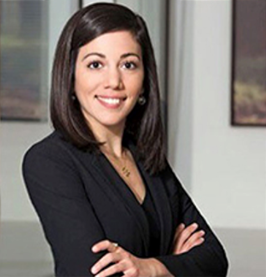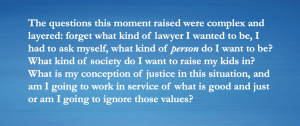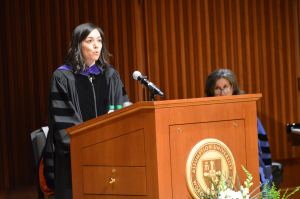Hounds with Purpose is a space for alumni to share their stories of purpose and vocational engagement beyond their years at Assumption. This blog is created by the Center for Purpose and Vocation and the Career Development and Internship Center (CDIC) to better connect students and alumni through experiential storytelling.
What is the value of a liberal arts education?
By Christina Graziano, Class of 2010, Partner at KBA Attorneys
The following post is Christina’s address delivered at the 38th Annual Honors Convocation on April 11, 2022. In her address, Christina shares her story of how she found her calling as a lawyer. At an early crossroads in her professional career, she found herself asking a set of essential questions that can lead anyone to discover one’s purpose and vocation: “What kind of person do I want to be? What kind of society do I want to raise my kids in? What is my conception of justice in this situation, and am I going to work in service of what is good and just or am I going to ignore those values?” We are grateful to Christina for sharing her story of vocation and of the value of the liberal arts with our blog readers.
There are two things unique to humans that no other animals do: we heat our food, and we communicate through stories. Stories allow us to relate our experiences in a way that invites the listener to engage and reflect on themselves in a different context. I spent a lot of time these past few weeks reflecting on how my Assumption education shaped and molded me, not just in terms of my career, but also in the kind of person I have strived to become. I have a quick story to tell you in that regard.
I graduated law school when I was just a few years older than most of the students in this room today. No one in my immediate family went to college, let alone law school, so I was eager to blaze my own trail and find a great first legal job right away. Meanwhile, I’d amassed a great deal of student loan debt in my quest to secure my law degree, and if I am being completely honest, that really influenced the types of jobs I sought and the life I envisioned for myself. The dream was to make as much money as possible as soon as possible, practicing whatever kind of law would get me there (seriously, if underwater basket weavers needed legal representation, for the right price, sign me up).
In my last year of school, I took a law clerk position at a very high-profile plaintiffs’ firm in Boston, one that represents survivors and victims of catastrophic injuries. The firm’s clients were hurt by pharmaceutical drugs and medical devices, by doctors and consumer products. Initially, I thought it was just “valuable experience” that would pave the way to more lucrative insurance defense work. I was asked to assist on a month-long product defect trial that was brought by our client, the widow of a man killed in a rollover accident. Without getting into the dirty details of the trial, suffice it to say it was a grueling experience: a lot of late nights, a lot of emotions. The partners were invested in this case heart and soul, but they weren’t getting paid hundreds and thousands of dollars per hour like their colleagues on the defense side of the aisle. The time came to wait for the jury to return their verdict, which meant that the lawyers do a lot of sitting around and talking. I struck up a conversation with the lead trial attorney for the defendant, and he said to me “don’t drink this do-gooder Kool-Aid. You’ll work like a dog and never make any money. Come to the defense side, the hours are more reasonable, the pay is exponentially better. You’ll pay off your loans faster and get to start living your life.”
As I nodded emphatically at everything this guy was telling me, I saw our client out of the corner of my eye. She was overcome with emotion and struggling to keep it together for her two little kids. The partners I worked for were playing hang man and tic tac toe with the kids so that their mother had a minute to breathe. As I sat watching this scene unfold, the realization started to wash over me: these lawyers had chosen to stand by this woman in her most profound moment of crisis. They had a chance to alter the course of this family’s life for the better. The questions this moment raised were complex and layered: forget what kind of lawyer I wanted to be, I had to ask myself, what kind of person do I want to be? What kind of society do I want to raise my kids in? What is my conception of justice in this situation, and am I going to work in service of what is good and just or am I going to ignore those values?
Ruminating on these fundamental questions does not require a law degree. It does not require you to be a lawyer, a doctor, or an investment banker. This self-reflection didn’t harken back to a single course I took where I could say, a ha! I learned this hard skill that I can now robotically apply to my legal career. Instead, this moment of introspection drew on the lessons I learned throughout the entirety of my liberal arts education here at Assumption. This moment forced me to examine my own heart, rail against my own limited shell of understanding at 20-something years old and decide then who I wanted to be and what I would value.
That little trial experience was resume fodder for me up until that point. But to that client, it was an experience that would change the course of her life and the lives of her children. It changed the course of my life as well, because I stopped seeing my clients as names in a roster or on the files stacking up on my desk. I wanted to be the kind of person who saw each client as an individual. I realized that my life couldn’t be about case inventories or fee projections, but rather had to be about the stories of the individuals I had the privilege to represent.
By the way, that defense lawyer, the one who tried to give me life advice, he doesn’t exist in a vacuum. Neither do the scores of men and women you’ll meet who will cast dispersions on your education. These people treat the liberal arts as a wayward, self-indulgent choice for those who cannot pick a real “career.” These people unequivocally value technical merit over a different set of skills, those that allow us to reflect on and move the soul of the individual and the soul of the society in which we want to live.
I’m seeing this point of view more and more often. There are forces aiming to eviscerate the liberal arts, arguing that a “more practical” education reigns supreme. I bet most of you have heard every misconception under the sun about the liberal arts – starting with those who think the “liberal” in liberal arts refers to left/right political leanings, or better still, folks who hear “liberal arts” and think “starving artist.”
Among the many things my liberal arts education taught me was a modicum of Latin, which is why I – along with the rest of us in the Assumption community — know that the term “liberal arts” has nothing to do with political ideology or paintbrushes. The liberal in liberal arts comes from the Latin liber, which means freedom, or to be free. A liberal arts education literally frees us from our baser instincts, our vices, our selfishness, and narrow-mindedness. This education liberates us, mind and soul, from the shackles of ignorance and apathy. It inspires us to reflect thoughtfully and compassionately, no matter the issue.
Now, I realize that I’m preaching to the choir here, speaking to students who’ve already chosen a liberal arts education, but I want you to understand how well this education will serve you and the people and pursuits you love. Because there will be times when skeptics try to diminish its value or when you have second thoughts of your own. To me, the value of an education rooted in the liberal arts really boils down to one thing: achieving greatness.
Christina speaking to a full audience in the Curtis Performance Hall, Tsotsis Family Academic Center
Now I don’t mean greatness with a Capital G. Capital G Greatness is the greatness they make Hulu limited series and Netflix documentaries about: the guy who invented Uber, the rise and fall of WeWork, Facebook or whatever Zuckerberg is telling us to call it these days. Jeff Bezos. Elon Musk. Kylie Jenner.
Capital G Greatness is usually defined by two things: money and power (which, in this context, is measured as “the ability to get more money”). When we talk about these great men and women, we often talk about their business acumen, their street smarts, their Machiavellian ends-justify-the-means ambitions that gave the world behemoths like Amazon and Apple. This, we say, is success. This is the American Dream: the self-made billionaire running his or her empire from the back of a Bentley or behind the desk of a C suite, far removed from the rest of the world and its pedestrian problems. We are told that this is the Greatness for which we should all strive. But I’m not talking about that kind of greatness.
The greatness I am talking about is the other greatness. Small g greatness. It was St. Augustine who said, “if you aspire to great things, start with the little ones,” and with that sentiment, I wholeheartedly agree. I can’t take credit for the concept of small g greatness. Perhaps during your Assumption education, you’ve heard small g greatness called by another name: magnanimity.
Thomas Aquinas defined magnanimity as “a certain aspiration of the spirit to great things.” Magnanimity means to be of “great soul” or “great spirit,” embodied in a person who strives for what is best in every aspect of his or her life. The magnanimous, or small g great person, sets their sights aloft in pursuit of a higher calling. This might be evidenced through their choice of profession, how they treat their family and friends, or the duty that they feel to society writ large. Small g great people don’t achieve magnanimity through one great act. Again, this isn’t Netflix special Greatness. There’s no dramatic music and build up to the big moment. Magnanimity is achieved quietly, slowly, by cultivating generosity of spirit and an affinity for the life of the mind.
To this end, the great souled man or woman must know themselves. Their passions, their vocations, that which gives them purpose and meaning. It’s what will dictate how you treat your family, your friends, and the world at large, and what enable you to live your real and unfiltered “best life.”
As Aristotle taught us, there can be no small g greatness without goodness. For big G greatness, let’s just say, goodness does not seem to be a prerequisite. And if you don’t think goodness is important to society, I would say go out and live a day in the real world, and you will see for yourself how a lack of goodness can only cause any society to collapse in upon itself.
A liberal arts education is part of the journey to finding this goodness, this magnanimity in oneself. Unlike the ubiquitous societal refrain posed to most college graduates, which is “how do you want to make a great living,” the liberal arts education helps us answer a much more important question: “how do you want to make a great life?” Studying the great books and thinkers allows us to transcend the boundaries of place and time and to conceive of our larger human purpose. Studying the liberal arts is quite literally a study of the human soul, the fruits of which undoubtedly make us think deeper, empathize better, become greater.
Not to say that all of you need to become poets, philosophers, or artists to lead great lives. I could feel some of the parents getting worried. The world needs lawyers, accountants, nurses; there are careers that you may one day embark on that don’t even exist yet. But it’s about how you orient your life and pursue these vocations that matters, whether for volume and profit or in service of the greater good. Become a great lawyer who does pro bono work in her spare time. A great accountant whose love for Renaissance art rivals her love of numbers. A great nurse who understands the suffering of his patients not just from a medical standpoint, but from a human one.
Studying the liberal arts delivers us from the vanity and selfishness of our modern age and allows the magnanimous person to rise above apathy and the pursuit of what is easy or cheap. It’s so tempting sometimes to turn off the news, to ignore the suffering of our neighbors, to deify material comforts. The liberal arts instead foster magnanimous men and women who rise up to injustice when countries lay waste to other sovereign nations, who strive to protect the sanctity of human rights for all people, who understand the virtues and vices inherent in the human condition. The tenets imparted through a liberal arts education illuminate the common good, awaken and sustain our intellectual curiosity. They teach us humility and grace. These lessons have survived throughout the ages, throughout centuries; they endure because they are timeless. They endure because they are great.
A liberal arts education gives us a constant guidepost, an orientation of one’s life, priorities, and values. While Assumption has grown and changed in the years since I attended, I am proud that our school has remained true to these core values and teachings. Assumption graduates are trained to be inquisitive, ethical, engaged citizens, who think freely, critically, and thoughtfully in whatever discipline or occupation they choose. The habits of thoughtful discussion and reasoned discourse fostered at Assumption stay with its graduates for the rest of their lives.
As Assumption’s own Bernard Dobski once told me when I was a student, a liberal arts education is not an education for four years, it is an education for forty years, and I can emphatically state that this sentiment is still alive and well at Assumption University. I can promise you, and I stand before you as living proof, that the lessons imparted by the Assumption liberal arts education will be the primary contributors to the enduring successes you’ll achieve in this life and will serve you well in your careers and vocations.
I implore you: when you encounter your own version of the nay-saying defense attorney, don’t listen to him. Don’t be overly concerned with society’s conception of greatness with a capital G. It’s ever-changing, it bends to the mores of the moment. Decide who you are, who you want to be, and endeavor to remain faithful to your values in the face of life’s myriad obstacles and distractions. Allow the tenets of your Assumption education to serve as an animating force behind all the great things that you pursue in this life.
You students are stewards of a rich intellectual tradition, one that long predates you and with the grace of God will endure long after the ink is dry on your diplomas. Your success is a credit to all of us, and the Assumption Community is proud of you. As you embark on your next chapter, whether it’s another year at Assumption or your first foray into the “real world,” I have every confidence that you will be well-served by your liberal arts education, that you’ll leave your mark on our society, and above all, that you’ll find the small g greatness that resides within you.
By: Christina Graziano, Class of 2010, Partner at KBA Attorneys
Edited by: Esteban Loustaunau & Pilar Betts






